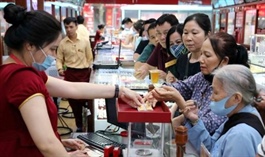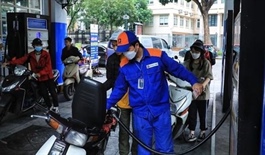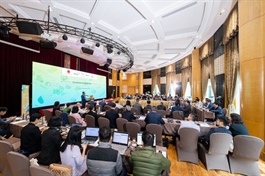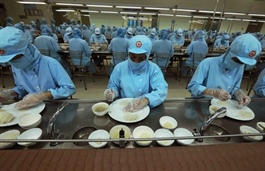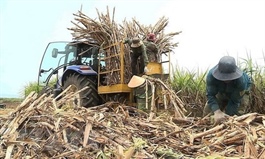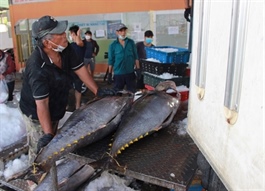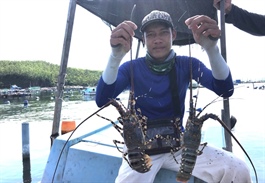Mekong Delta to develop one million hectares of high-quality, low-carbon rice production by 2030
Mekong Delta to develop one million hectares of high-quality, low-carbon rice production by 2030
The central Government has set a target for the Mekong Delta to establish one million hectares of high-quality, low-carbon rice production by the year 2030 in a decision signed on Monday by Deputy Prime Minister Trần Lưu Quang.
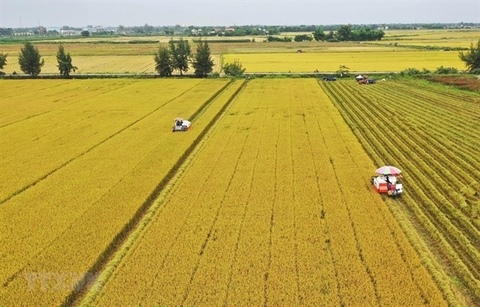
Rice harvest in the Mekong Delta province of Kiên Giang. — VNA/VNS Photo Hồ Cầu |
The project will be deployed across the provinces of An Giang, Kiên Giang, Đồng Tháp, Long An, Sóc Trăng, Cần Thơ, Bạc Liêu, Trà Vinh, Hậu Giang, Cà Mau, Tiền Giang and Vĩnh Long.
The project is part of an effort to restructure the region's production system and value chain with a focus on sustainable farming practices, higher product value, greater business and production efficiency, as well as improved livelihoods of rice farmers, in accordance with Việt Nam's commitment to protect the environment, adapt to climate change and reduce greenhouse gas emissions.
In terms of sustainable farming, the project aims to reduce seedlings to less than 70 kilogrammes per hectare, decrease chemical fertiliser and pesticide use by 30 per cent, and reduce irrigation water by 20 per cent compared to traditional farming. All production areas are expected to apply at least one sustainable farming practice, such as the 1 to 5 reduction, Sustainable Rice Platform (SRP) production standards, alternate wetting and drying, and certified good agricultural practices with designated growing area codes.
Regarding production organisation, all production areas are expected to link up with enterprises and cooperative groups, cooperatives, farmer organisations and consumers. The mechanisation rate is to exceed 70 per cent with more than one million households partaking in sustainable farming practices.
The project aims to reduce harvest losses to below 8 per cent, collect 100 per cent of straw from fields for reuse, and reduce greenhouse gas emissions by over 10 per cent compared to traditional rice cultivation methods.
In terms of farmers' income, the project aims to increase the value added in the rice value chain by 40 per cent by 2030, with a profit margin for rice farmers greater than 50 per cent. High-quality and low-emission rice exports are expected to account for over 20 per cent of the total rice exports from the entire dedicated cultivation areas.
Phase 1 of the project (2024-2025) is to focus on consolidating existing areas covered by the 180,000-hectare Sustainable Agriculture Transformation Project in Vietnam (VnSAT) with a pilot programme on carbon credits for areas that meet required emission standards and plans to strengthen local cooperatives and upgrade infrastructures.
Phase 2's targets (2026-30) include identifying areas suitable for high-quality, low-emission rice farming areas beyond the VnSAT that prioritise infrastructure planning and investment, production restructuring, value chain building and infrastructure.
The Ministry of Agriculture and Rural Development (MARD) has been tasked to lead and coordinate with other ministries, local authorities and economic sectors in the Mekong Delta region in the implementation of the project.
MARD has also been told to develop regulations on measuring, reporting, and verifying greenhouse gas emissions, in line with international regulations and specific conditions in Việt Nam, as well as to submit a proposal on a pilot programme for result-based carbon credit payments.
The project is to introduce four key programmes, including capacity-building for cooperatives and businesses participating in the project; credit support programmes for linking production, processing, and consumption of high-quality, low-emission rice products between cooperatives and businesses; modernisation of production infrastructure for one million hectares of high-quality rice; and a carbon payment pilot programme.
According to MARD, the project is to play a key role in the development of Việt Nam's eco-agriculture, which will fundamentally transform the rice sector in the direction of sustainability.
Dr. Trần Công Thắng, head of the Insititute of Policy and Strategy for Agriculture and Rural Development under MARD, said the objective of the project is to reorganise the production system along the value chain, applying sustainable farming practices to increase the value and promote sustainable development of the rice industry.
Dr. Dương Văn Chín, former deputy director of the Mekong Delta Rice Institute, said the reduction of greenhouse gas emissions is imperative for the survival of the current climate and is a globally oriented action plan.
"We must join hands not only because of the Vietnamese Government's commitment to the world but also for the current and future living environment of each of us," said Dr. Chín.
"Only in this way can Việt Nam achieve its set goals. We need to review activities that can be reduced and make a concerted effort to implement them well."
He said to reduce greenhouse gas emissions, it is necessary to use certified seeds, reduce the use of seeds, decrease chemical fertilisers and pesticides, implement alternate wetting and drying irrigation, and refrain from burning straws.








